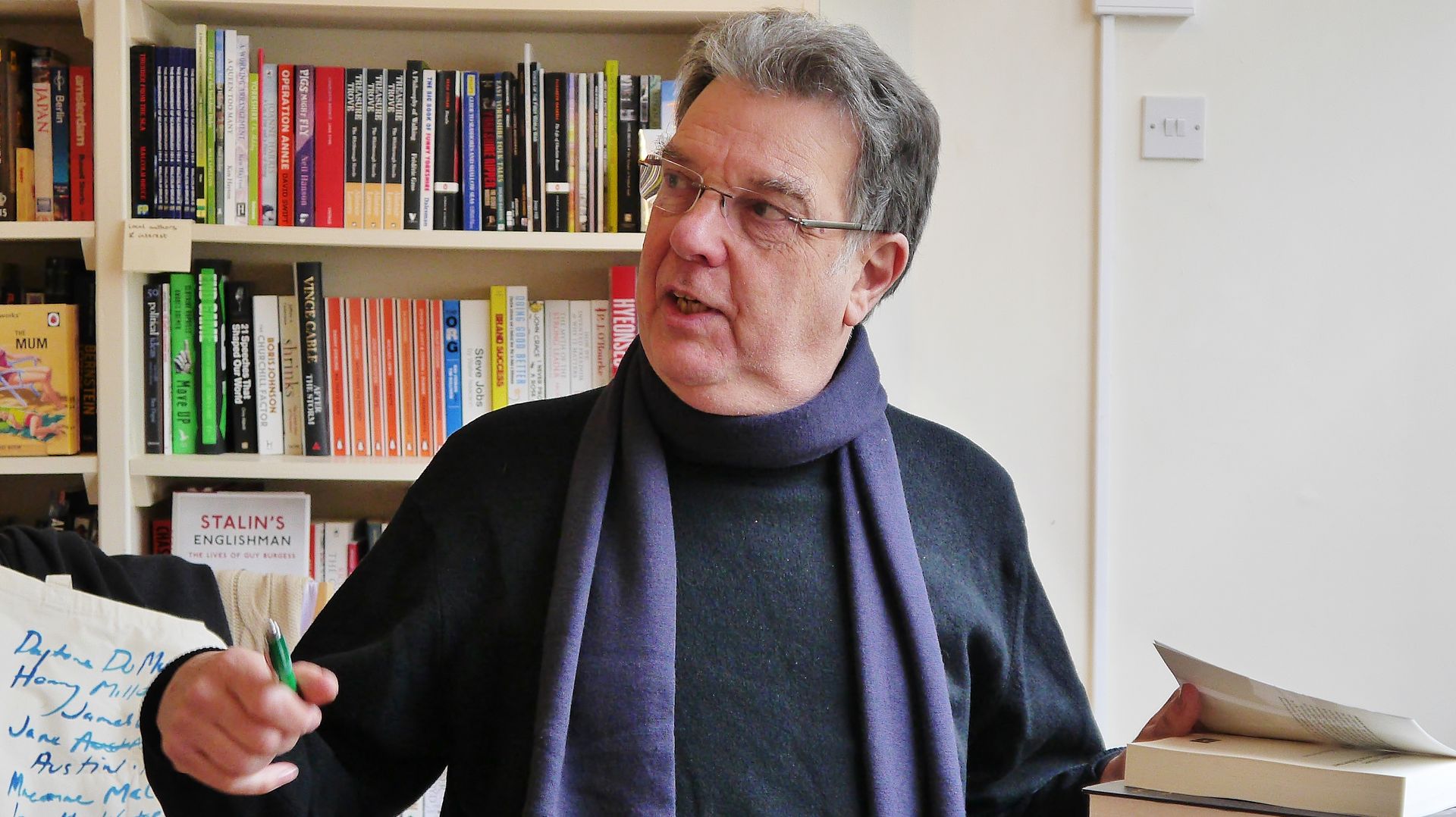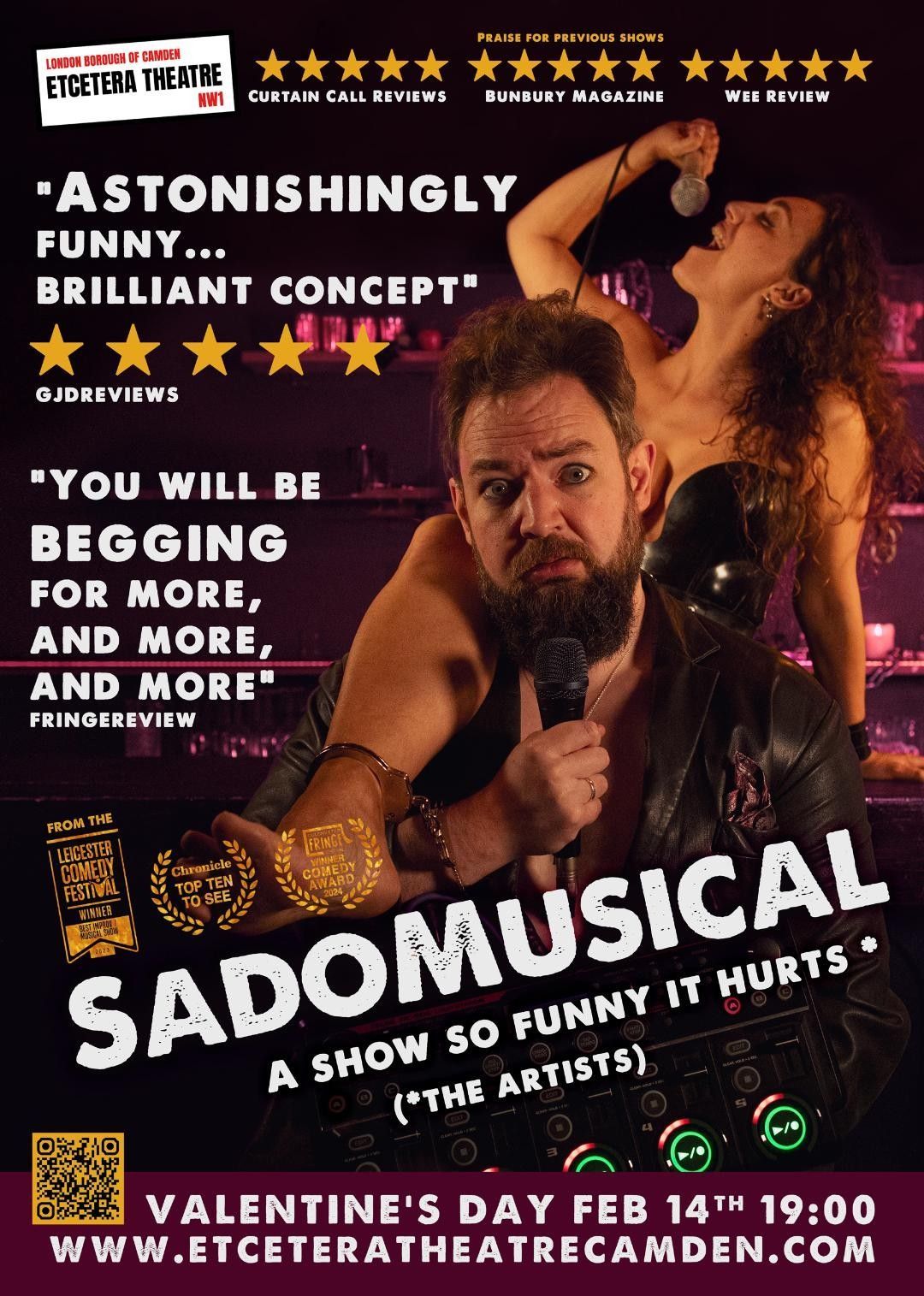Journalist and author FRANCIS BECKETT on his new political comedy MAKE ENGLAND GREAT AGAIN opening Upstairs at the Gatehouse 30 September
by Heather Jeffery 9/9/2025

NEWS: NEIL KINNOCK TO SPEAK ON THE THREAT FROM THE FAR RIGHT Following the first night 30 September audiences will be invited to stay for a discussion with Lord Kinnock, former leader of the Labour Party and former European Commissioner
Francis Beckett’s new comedy Make England Great Again is also a warning. After the general election victory of the Britons First Party, charismatic leader Max Moore enters number ten.
“What interests me is not the questions that the newspapers keep asking; they're obsessed with the idea of could Nigel Farage be the next prime minister? A question that obviously matters to an extent but it doesn’t matter half as much as the more general question of would it be possible for a far right authoritarian to subvert the British Constitution in the way that Hitler subverted the Weimar Constitution, in the way that Mussolini supported the Italian Republican Constitution, in the way that Trump is trying and succeeding to some extent, in subverting the United States Constitution. How vulnerable is Britain to a leader who wishes to be that sort of authoritarian leader.
“The British Constitution gives very little protection. We talk about the strength of the unwritten Constitution in Britain , but I think the unwritten Constitution gives much less protection than a written Constitution.”

Francis Beckett at home
Francis Beckett’s plays have become a popular staple at Upstairs at the Gatehouse, selling out Tom Lehrer is Teaching Math and Doesn’t Want to Talk to You, and meeting success with his political plays, Vodka with Stalin and A Modest Little Man.
Beckett is lucky because the management at the Gatehouse is interested, not in what is generally trendy and fashionable, but what their audience wants, with a focus on political theatre and musical theatre. “It’s why against all the odds, without any public funding, the Gatehouse survives as well as it does,” says Beckett. The North London venue has a big Jewish community, and the conversation turns to Beckett’s personal family background, having written a book about his Jewish Grandmother and his father’s connection with fascism. “it is crammed with less elevated things” says Beckett. “I don’t mind talking about it all. It all happened before I was born. The reason I was born in May 1945 is that my father came out of prison in late 1943. There is a cause and effect here. It is certainly true that having studied my father’s life and having studied fascism in Britain it has, to some extent, helped to create this play.”
The lead character on the right, the authoritarian leader in the plays is called Max Moore. Beckett is maxing out on the idea of more; bigger and stronger and better and all of that. He’s also taken phrases from Mosley’s speeches to give authenticity. One of them has a particular significance for Beckett. When Mosley formed the British Union of Fascists he said: ‘I am done with those who think, henceforth, I shall go with those who feel.’
“Now that is an almost a textbook expression of what fascism is” says Beckett. “If you don’t want to be bothered to think, if you want to go with those who feel and where their feelings take them, for example, to outside a hotel where refugees are housed, where they throw stones at it. You are subcontracting your thinking to the authoritarian leader. So that’s why it seems to me, it’s almost a textbook description of what fascism is.”
Beckett is known as an education journalist having written for the New Statesman, The Guardian and The Independent. Beckett was writing largely about education which is of course, deeply political. He was the main critic of the Blair government’s education policies and the move towards academies. Going back, he was on the committee of the campaign that opposed the 11 plus. “I mean in the end it’s quite simple,” says Beckett. “John Major talked about having a grammar school in every town. What nobody talks about is if you have a grammar school in every town you have to have a secondary modern school in every town.” Beckett admits that some of his happiest memories of childhood was when he attended Rickmansworth Grammar School until he was taken out and sent to Beaumont College a Jesuit boarding school near Windsor.
Beckett has been dubbed an ‘Old Labour romantic’. “This is Mike White, the political editor at The Guardian and I was rather flattered really,” says Beckett. “’Old labour’ is simple, that simply means what labour was before Tony Blair came along. ‘Romantic’, that’s just a word, it’s just one of those words that people use when they want to say that everything you’re saying is completely unachievable.”
“The best known book that I wrote was a biography of Clement Attlee. And I suppose he probably meant that I tend to hark back to the Attlee government as the exemplar of how it ought to be done. Then when I started writing plays the first subject that occurred to me to write about was Clement Attlee and I wrote A Modest Little Man.”
“Coming back to the present play I think possibly the heart of it all, is that nothing can be achieved without a strong public sector. it’s the one big difference between the authoritarians of today and those of the 30s. In the 30s they wanted a corporate state. Now they want the state run by corporations. It’s a subtle difference.”
“So, Hitler and Mussolini wanted to build up the state so that the state could control everything. What todays’ authoritarians want to do is to tear down the state, so that they can control everything. It’s the same thing in effect. Because what you are doing is putting your place men in all the leading positions. Which is why Hitler called his party the National Socialist Party, whereas todays’ authoritarians would be horrified to include the word ‘socialist’ in anything they were ever associated with. They stand in roughly the same place. It’s just that they approach it from a different angle.”
The play is billed as comedy. “Comedy as you know is not jokes, a comedy arises out of the situation and the characters. We have King Charles III as one of the characters. I think the scenes between King Charles III and Max Moore are quite funny … but we have to see whether they get a laugh when they’re on. They’re a little bit like the scenes I had in my Attlee play between Clem Attlee and King George VI, which were very funny, and which were based on their actual meetings.
“In 1945 when the election was won, his wife drove the family Hillman Minx to Buckingham Palace and parked it outside and everybody assumed that she was the chauffeur. To her this was perfectly normal. She sat outside in the car until her husband had had his interview with the King. You have these two, very shy public school educated, men looking at each other from either side of a vast Buckingham Palace chamber and Attlee had won the election and the king said 'I know, I heard it on the 6 o’clock news’. That always gets a laugh.”
Beckett was also public school educated which feeds into his work. He had a radio play about it, The Sons of Catholic Gentlemen. “The character of Max does owe something to people I knew at school” adds Beckett.
The director is actor Owain Rose whose day job is training actors at Northampton University. He also directed the Attlee play and the Stalin play. “I enjoy working with him very much and he likes my work very much” adds Beckett. Out of the four actors, three of them have been in his previous play. The character of Max Moore is played by Silas Hawkins who played Hugh Dalton in the Attlee play. He also played George Lansbury the Labour Party leader of the 1930s in his Stalin play. “He’s a very good, very interesting actor but I have to stop him bringing his dog to rehearsals” laughs Beckett. “One of the more interesting things about Silas is that his father, Peter Hawkins was the voice of the Daleks. And he was also the voice of the Flower-Pot Men.”
This isn’t Beckett’s first comedy, most of Beckett’s plays have been a bit of fun including A Modest Little Man built around Clement Attlee’s love of cricket. “Everybody thinks he is a boring little man and actually he was one of the funniest and cleverest men ever.” says Beckett. The Gatehouse wants to bring it back and Beckett would like to take it to South London as well, but he hasn’t found a suitable venue yet.
Beckett’s plays are well researched but he says himself "if you regard it as a place in which you put down all your research, you shouldn’t be writing a play, you should be writing a PHD Thesis”. The local audience are interested in the politics, they like the subject, but they’re still not going to turn up unless it works as a piece of theatre. You need the word of mouth.






